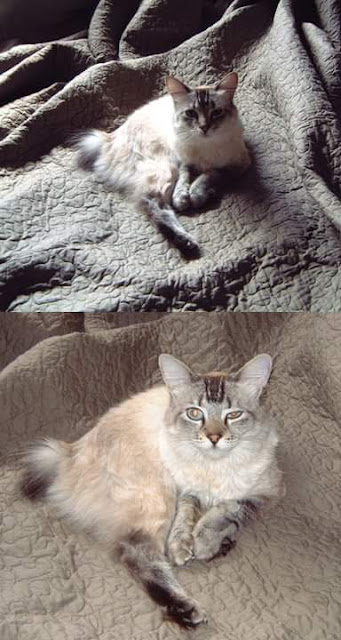The Power of Cold (and Hot)
What we have here is video of my new Stirling Engine. As shown it is sitting on top of a hot glass of water. This heats the bottom plate. Room temperature air (and sometimes an ice cube) cool the top. This creates a temperature differential which starts the engine spinning.
This is not a steam engine! Hot air expands and pushed the piston to the cold side. The hot air leaks past the piston to the cold side too which makes the gas contract, pulling the piston back down. It's a sealed system so the now cold air heats again and the piston goes up and down over and over again. It's seems very simple, yet probably is the most complex thing I've had on my blog!
So, if you supply heat and cold to the top and bottom it outputs power/work. With hot water out of a coffee maker this particular engine ran ran for over an hour at about 200 rpm. After it started slowing down I added an ice cube to the top plate and it sped back up for another half hour or so.
But, of you supply power/work with an electric motor it outputs cold/heat. Tiny versions of this are actually used to cool microchips in imaging and night vision systems. Although a similar invention called the Peltier Cooler is rapidly replacing it. Peltier Coolers are solid state devices with heat sinks that transfer heat from one side to the other using electricity (power/work).
Another use for these subtle, quite, simple engines is in submarines. My other blog is the devoted to my model submarines. I love subs!
(http://mikelogusz.blogspot.com)
Anyway, stealth and air are a concern for submarines. Recently Saab (under the name Kockums Naval) debuted a Stirling Engine for sub propulsion: quite and no need for air/diesel/nuclear replenishment. Russia's attack on nearby Ukraine had seen more focus on the Swedish manufacturer's efforts on the realm of quieter than stealth subs powered by these AIP (air independent propulsion) systems. No more surfacing to get air for the electric and diesel systems of old: the 1816 brain child of the Reverend Stirling has come of age big time. With the renewal of Cold War antagonisms we'll see cutting edge efforts to incorporate this old technology anew.
Segway inventor Dan Kaman is researching then for augmenting our power grid, solar power companies are researching them for the same reasons. Kaman has come up with a Stirling Engine called the Beacon 10 which can generate electricity (power/work) from natural gas for a home or can be used in the reverse to heat water (for a laundromat for example).
You'll notice a clacking noise in my Stirling Engine: it has metal on metal connecting points with no bearings. A little bit of graphite powder lubricant or a simple set of roller bearings would make this thing almost completely silent. There is a little slop in the system that can be taken out by tightening the length of the piston arms. That alone would probably diminish the slight noise by about 90%.
Stealth beyond stealth.
A hot mess on the bottom pushes your eye up to the cool cat on top, then back down again. Thank goodness for moody lighting and PhotoShop! Meow.
